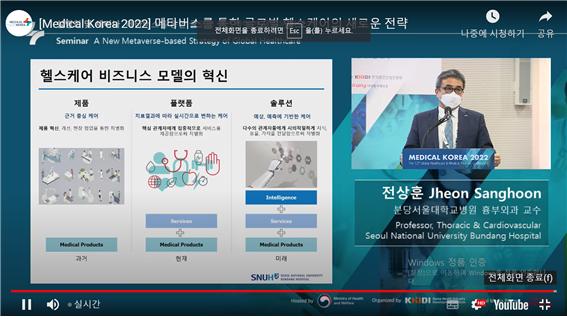“In the not-too-distant future, there will be a cloud-based general hospital that operates beyond borders. Medical education, research, and clinical trials will take place in this space. This seems to be the future of healthcare.”
Jheon Sang-hoon, a professor of thoracic and cardiovascular surgery at Seoul National University Bundang Hospital (SNUBH), said this and other remarks during a seminar on the topic, “A New Metaverse-based Strategy of Global Healthcare,” at Medical Korea 2022.

Metaverse, enabling people to engage in political, economic, social, and cultural activities in virtual space, has become a hot topic worldwide. In addition, the medical community is also making various attempts to utilize metaverse for patient care.
In his presentation on “Future Medical Ecosystem and Metaverse,” Jheon explained how metaverse could be used in healthcare.
In the past, healthcare used to treat diseases and operate at a hospital, he said.
However, healthcare providers encourage individuals to receive regular health screenings to maintain their health efficiently, he said. Furthermore, healthcare is evolving to prevent risk factors, he added.
While medicine in the past focused on medical technology to advance equipment such as CT scanners, the current medicine’s business model is changing into services and platforms, Jheon went on to say.
He predicted that these platforms would become more prediction- and prevention-based systems, providing services for doctors and hospitals.
He said these changes would occur because of the advancement of AI, big data, and networks.
“Through these technologies and participation of patients, we should make cultural advances. In this perspective, the metaverse is the hottest topic,” Jheon said. “The metaverse concept is still incomplete, but we cannot reverse the trend.”
As general-purpose technologies are fused with XR (extended reality), there will be new experience designs, and healthcare is no exception, he forecast.
Promoted by the WHO, “Universal Health Coverage” refers to individuals’ or communities’ access to health services in all cycles ranging from prevention to treatment and rehabilitation without financial difficulties.
Still, the global healthcare gap remains wide, and metaverse will be “the most crucial tool” to narrow the gap, Jheon added.
Jeon took CPR training as a good example.
In the past, physician trainees gathered in the auditorium to watch videos and practice a few times, but using Metaverse, they can perform CPR directly on a manikin and experience while communicating with virtual patients, AI instructors, and people who ask for help in a virtual space, he said.
He noted that the trainee’s data would be managed in big data, which will become important to improve educational programs.
Metaverse technologies can be used in various areas, including labs, intensive care units (ICUs), infectious disease control offices. In addition, related technologies are being developed for education for medical procedures and rehabilitation, Jheon explained.
SNUBH has almost completed developing a metaverse technology to help relieve the stress of cancer patients when they get anticancer drug injections, according to Jheon.
Also, metaverse technologies in global medical training and telemedicine will contribute to establishing a hospital that operates without the limitation in time and space, he predicted.
“A general hospital without borders will be created for education, research, and clinical trials,” he said. “Korea has advanced IT and healthcare, so the combination of the two will help the nation take leadership in these global trends.”

